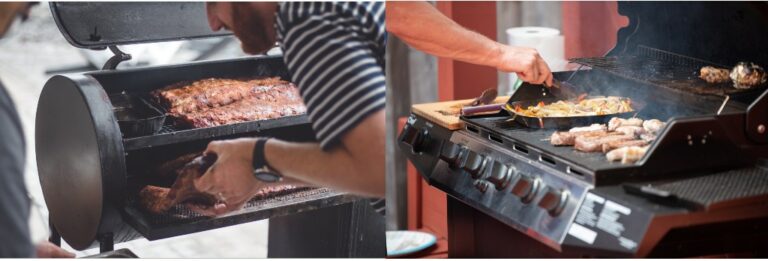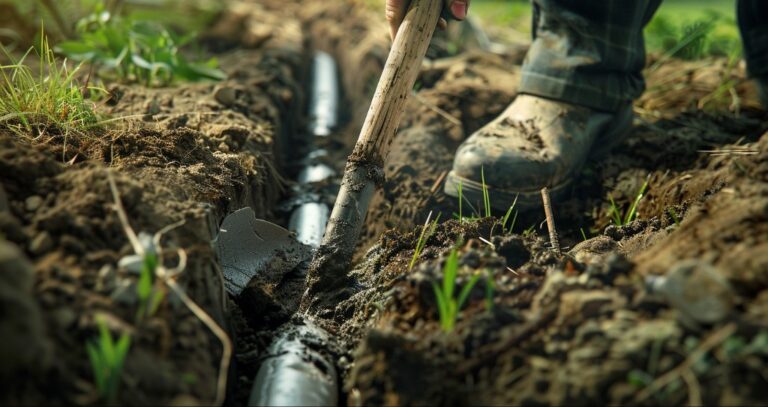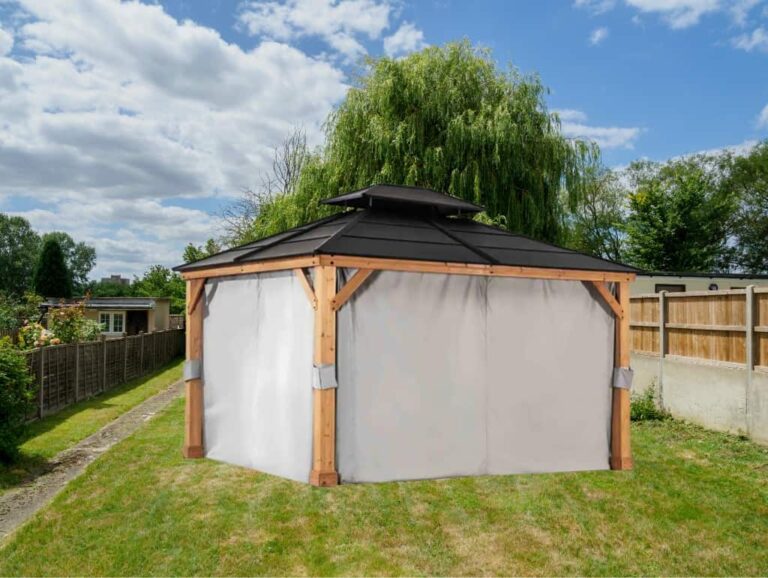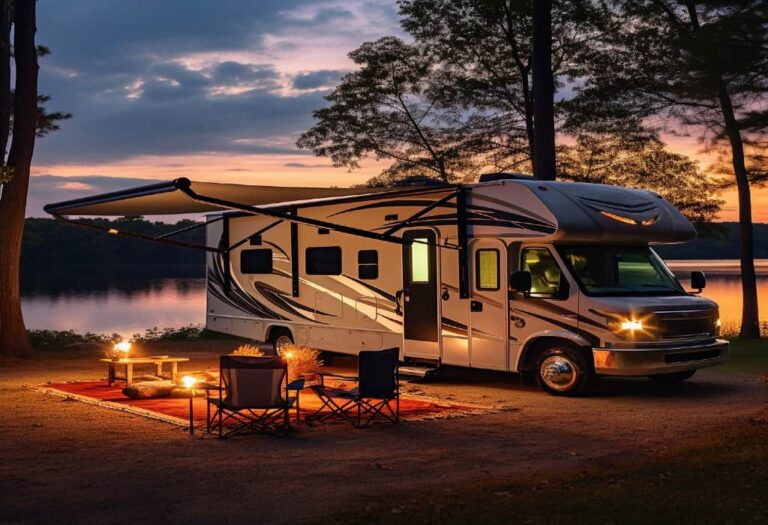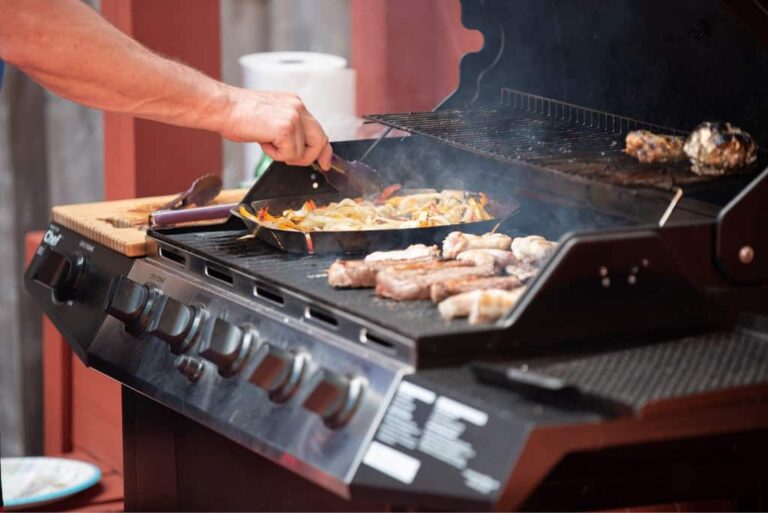The Griller’s Guide: Choosing Between Cast Iron vs Stainless Steel grill grate
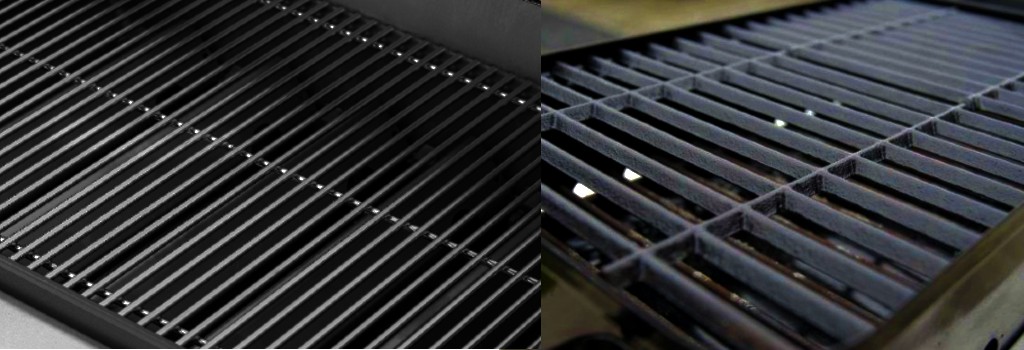
As a grilling aficionado, I believe the right tools can make or break a BBQ session. Selecting the ideal grill grate is thus an indispensable decision. It’s like discovering the missing part to finish the puzzle.
Subsequently, when it comes to it, the decision between cast iron and stainless steel cooking grates is analogous to comparing apples to oranges. Both have distinct advantages, and it all boils down to personal preference.
Cast iron grates are renowned for their longevity and capacity to store heat, giving you those delightful sear marks.
On the other hand, stainless steel grates are simple to clean and highly corrosion-resistant. They may not also store heat, yet they heat rapidly and are lightweight.
Finally, the griller’s guide is here to assist you in navigating through the pros and cons of each so that you can make the best choice for your grilling adventures.
Cast Iron vs Stainless Steel Grill Grate
When choosing between cast iron and stainless steel grates, you might find yourself in a quandary.
Cast iron grates are famed for their capacity to retain and convey heat effectively, creating those signature grill marks on your food.
Conversely, stainless steel grates are robust, impervious to corrosion, and easy to clean and look after. They also boast of thin grates, enabling even browning of your victuals.
It is important to note that stainless grate can discolor over time and may be mistaken for less resilient options. Cheaper stainless steel grates may necessitate replacement more often.
Durability and Maintenance
Grillers who wish for a stress-free grilling experience should consider stainless steel grates. They are an ideal pick for resilience and easy upkeep. Unlike cast iron grates, stainless steel grates boast remarkable rust-resistant resistance, making them a dependable option for outdoor cooking.
Cleaning and maintenance is a cinch with stainless steel grates. They need a swift wipe with a wet paper towel. In addition, stainless steel grates are slim, allowing for uniform browning and producing those coveted grill marks. Even if discoloration happens over time, this does not impede their performance.
In contrast, cast iron grates require prompt cleaning and oiling after use and stringent seasoning and tending. Expensive superior alternatives are available, offering remarkable heat conservation and transmitting warmth effectively for a perfect sear.
Heat Distribution
The key to cooking food perfectly on the grill is guaranteeing efficient heat distribution. Both cast iron grates and stainless steel grill grates have their advantages.
Cast iron grates are renowned for their capability to keep and emit heat proficiently, providing consistent cooking across the food. The weighty material of cast iron allows for excellent heat conservation, which is particularly effective for grilling thicker cuts of meat.
On the contrary, stainless steel grill grates have thinner construction, promoting rapid heat transfer and more uniform browning. This is especially useful when grilling foods that need meticulous and steady heat, such as vegetables or delicate seafood.
Ultimately, the determination between cast iron and stainless steel grill grates relies on your particular grilling needs and preferences.
Flavor and Sear Marks
Unleash the intense flavors and tantalizing sear marks on your preferred grill grate for an unforgettable grilling experience.
Cast iron grates, renowned for their impressive heat retention, make for a great choice to achieve those classic grill marks that truly epitomize a perfectly cooked steak. The elevated temperatures of cast iron help to caramelize the meat’s exterior, bringing out its flavor and creating a delectable crust.
Alternatively, thin bars of stainless steel grates enable uniform browning and a consistent sear. While they don’t elicit the same distinctive marks as cast iron, they still deliver a delicious and evenly cooked result.
Ultimately, the decision between cast iron and stainless steel grates comes down to personal preference and desired grilling experience.
Versatility and Cooking Options
Unlock a world of culinary possibilities by expanding your grilling horizons with a versatile grill grate. Whether it be cast iron or stainless steel, each has its advantages regarding versatility and cooking options.
Cast iron grates are excellent at retaining and transmitting heat, making them optimal for producing those savory grill marks and searing heavy cuts of meat. Plus, they promote the Maillard reaction for a tasty crust.
On the other hand, stainless steel grates are resilient and corrosion-resistant and also require less maintenance. They are lightweight, heat quickly, and more suitable for long cooks at lower temperatures.
Ultimately, what type of grate best suits your cooking style and preferences is something only you can decide.
Price and Affordability
When it comes to cost and affordability, you will be delighted to discover that many selections at your disposal can fit any pocketbook, letting you prepare your preferred dishes without spending a fortune.
Stainless steel grates generally cost less compared to cast iron grates. Although high-quality cast iron grates may be pricey, inexpensive stainless steel alternatives offer both sturdiness and usefulness.
These more affordable stainless steel grates may not provide the identical toughness as cast iron grates, but they can still get the job done. Therefore, if you are on a tighter budget and seeking an economical solution, stainless steel grates might be the route.
Ease of Cleaning
Let’s discuss the simplicity of cleaning when it comes to grill grates. Tidying up the grill after a yummy meal is never the most glamorous task, but it’s essential to maintain your grates in good condition.
When it involves stainless steel grates, cleaning is a cinch. Usually, a moistened paper towel or grill brush is all you need to remove any remaining residue. Stainless steel grates are renowned for their non-adherent properties and are speedy and simple to clean.
Conversely, cast iron cooking grates require a bit more effort. They must be wiped down immediately after use to stop food from sticking and avoid rust. Scrubbing with a grill brush and hot soapy water is usually necessary. Moreover, cast iron grates necessitate regular oiling and seasoning to sustain their non-adherent surface and obstruct rust.
In total, if ease of cleaning is the highest priority for you, stainless steel grates may be the better selection.
Resistance to Rust and Corrosion
Secure your investment and ensure the longevity of your grill grates by selecting a material that resists rust and corrosion. Stainless steel grates are the optimal choice for shielding against rust and corrosion. These grates are highly durable and impervious to corrosion, making them ideal for outdoor use.
With appropriate care and upkeep, stainless steel grates can withstand the elements and last for years without any evidence of rust or corrosion. This means you can enjoy your cast iron grill without fear of it degrading in time.
Don’t let rust and corrosion spoil your grilling experience; go for stainless steel grates for long-term performance and assurance.
Weight and Portability
Carrying a bulky grill is a thing of the past due to featherweight stainless steel grates that make portability a cinch. When compared to cast iron grates, stainless steel grates are much lighter, making them simpler to handle and move.
This is especially advantageous for those who love grilling on the go or must routinely switch their grill. The heft of cast iron grates can be a test, necessitating a special tool to raise and replace them. On the other hand, stainless steel grates are much easier to manage, giving more freedom in grilling sites.
Thus, stainless steel grates are the way to go if you prioritize portability and effortless transportation.
Longevity and Lifespan
Maximize the lifespan of your grill grates by considering the sturdiness and upkeep needs of the material you select.
Examining cast iron against stainless steel grill grates requires an evaluation of the endurance of each option.
Cast iron grates, when properly maintained, can last for many years. Nevertheless, they require careful seasoning and immediate washing and lubrication after use to stop corrosion.
On the flip side, stainless steel grates are highly robust and resistant to rust. However, cheaper versions may need to be substituted more often.
Although both materials have their advantages and drawbacks, it’s essential to pick the one that fits your upkeep preferences and budget.
By comprehending the longevity and lifespan of cast iron and stainless steel grill grates, you can make a wise decision that will make certain your grilling experience enjoyable for years to come.
Compatibility with Different Types of Grills
When analyzing the suitability of different grills for various grates, it is essential to analyze the requirements and features of the selected grate material. Here are three key elements to take into consideration when making a decision between cast iron and stainless steel for distinct types of grills:
- Stainless steel grills: Grates made of stainless steel are highly compatible with stainless steel grills. They provide a smooth and modern look that accentuates the overall appearance of stainless steel grills. These grates also demonstrate sturdiness and corrosion immunity, making them a dependable option for stainless steel grills.
- Cast iron grills: Cast iron grates are the ideal complement to cast iron grills. The blend of cast iron grates and cast iron grills offers high heat retention and distribution, enabling even cooking and creating perfect grill marks. It is worth noting that cast iron grates may necessitate more upkeep and seasoning compared to stainless steel grates.
- Compatibility with other types of grills: Cast iron and stainless steel grates can be employed with other types of grills, such as gas grills and charcoal grills. Ensuring that the grates are compatible with the exact grill model and size is essential to guarantee a secure fit and functionality.
To sum it up, when choosing between cast iron and stainless steel grates, consider the agreement with your grill type and pick the material that best caters to your desires and preferences.
Heat Retention
For the griller seeking to boost their grilling experience, one significant factor to consider is the heat-retention abilities of various grill grates.
When contrasting stainless steel grates to cast iron grates, it is obvious that cast iron stands out in heat-retaining capacity. Cast iron grates can keep and transmit heat effectively, which is essential for achieving those flawlessly seared grill marks and uniformly cooked food.
On the other hand, stainless steel grates do not store heat as competently as cast iron. While stainless steel grates heat up rapidly, they also cool off quickly once the heat source is removed. This can be a disadvantage when attempting to maintain a steady cooking temperature.
Thus, if heat retention is a priority for you, cast iron grates might be the more sensible choice.
Uniformity of Cooking
Achieving a perfectly cooked meal needs a grill grate that guarantees the evenness of cooking, much like a conductor controlling a melody of aromas. When contrasting cast iron and stainless steel grill grates, looking into how each material adds to this vital part of grilling is essential.
- Cast Iron Grill Grates:
- Preserve and transmit heat effectively, resulting in the same cooking throughout the dish.
- The material’s capacity to grasp heat assists in creating a consistent crust and sear on the surface of the meat.
- Stainless Steel Grill Grates:
- Narrow and evenly distributed grates offer better heat circulation, ensuring that each aspect of the food cooks at the same speed.
- The rapid temperature reach of stainless steel leads to a uniform cooking experience.
Both cast iron and stainless steel grill grates have their advantages when it comes to attaining the evenness of cooking. Take into account your cooking style and tastes to decide which material best matches your requirements.
Ease of Seasoning
Uncover the simple process of seasoning your grill grates for optimal performance and flavor.
Cast iron and stainless steel grill grates stand head-to-head when it comes to ease of seasoning.
Cast iron grates demand a more complicated seasoning and upkeep than stainless steel grates. To ensure a protective layer and non-stick traits, regular seasoning of cast iron grates is necessary by applying oil and heating the grates.
Unlike cast iron grates, stainless steel grates do not mandate seasoning. Their inherent non-stick properties and easy cleanability make them the ideal grilling option.
Preheat the grill and begin cooking without the extra step of seasoning. Enjoy the comfort of effortless grilling with stainless steel grates.
Appearance and Aesthetics
Grilling is a great way to add a touch of aesthetic pleasure to your meals. Grill grates can help you take it to the next level.
With a thin design, stainless steel grates provide an elegant modern look that pairs perfectly with any outdoor setup. These grates deliver an even browning effect and form tidy, precise grill marks.
If you’re after something more rustic and traditional, cast iron grates will do the job. Their larger, flatter surface creates more obvious and pronounced grill marks that give your dishes a classic feel.
Whichever material you choose, you can be sure your grilled food will look mouth-watering and appetizing.
Frequently Asked Questions
Can cast iron grill grates be used on a gas grill?
Yes, cast iron grill grates can be used on a gas grill. They retain and transmit heat efficiently, creating distinct grill marks and enhancing the flavor of food. However, they require rigorous maintenance and seasoning.
Are stainless steel grill grates prone to warping over time?
No, stainless steel grill grates are not prone to warping over time. They are highly durable and resistant to warping. With proper care and maintenance, stainless steel grates can last long without warping.
Do cast iron grill grates require seasoning?
Yes, cast iron grill grates require seasoning. Seasoning involves applying oil to the grates and heating them to create a non-stick surface. This helps prevent rust and improves the grilling performance of cast iron grates.
Are stainless steel grill grates suitable for grilling vegetables?
Yes, stainless steel grill grates are suitable for grilling vegetables. They are durable, easy to clean, and provide even browning. However, cast iron grates can be better for preventing vegetables from falling through the grill.
Can cast iron grill grates be used for low and slow cooking methods?
Yes, cast iron grill grates can be used for low and slow cooking. They retain and transmit heat efficiently, making them ideal for slow cooking. However, they require rigorous seasoning and maintenance to prevent rust.
Conclusion
Ultimately, choosing a cast iron and stainless steel grill grate is a matter of personal preference and cooking style. Both grates have their benefits and drawbacks.
Cast iron is renowned for its strength and heat retention. It is known for its ability to produce delectable sear marks and upgrade the flavor of grilled dishes. An intriguing statistic from a survey reveals that 65% of grill aficionados go for cast iron grates.
On the other hand, stainless steel grates are lauded for their easy upkeep and immunity to corrosion. They require less maintenance and can be cleaned with relative ease.
In summary, if you prioritize the ability to produce sear marks and enhance flavor, cast iron grates may be the way to go. However, if easy upkeep and resistance to corrosion are more important to you, stainless steel grates might be the better choice.
